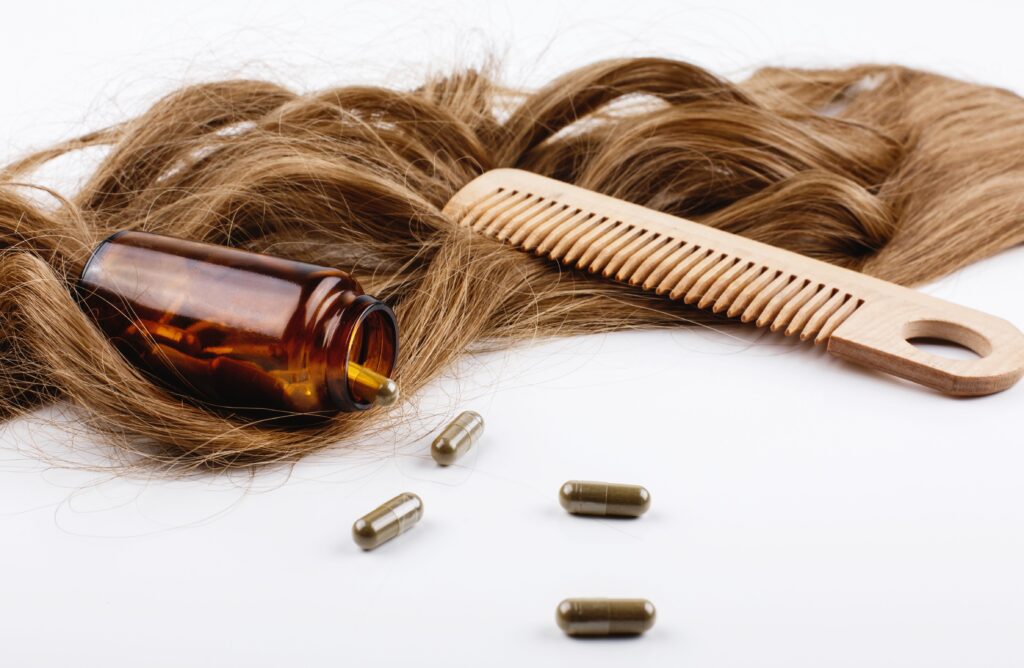FREE SHIPPING OVER $50
Vitamin Deficiency and Hair Loss: What You Need to Know
If you are experiencing hair loss you might be quick to blame genetics or stress. But did you know that a lack of certain vitamins could be the culprit? In this blog post you will learn how vitamin deficiency can lead to hair loss.
Key Takeaways
The Connection Between Vitamins and Hair Health

Our bodies are complex systems that require a balance of nutrients to function properly. Just like your heart, lungs, and skin, your hair is affected by what you eat. When your diet lacks essential vitamins, your hair can suffer.
Think of your hair as a garden. How well it grows depends on what’s happening “underground”. In the case of hair, it’s the nutrients in your bloodstream that matter. Without the right vitamins, your ‘hair garden’ may face a tough time.
Which Vitamin Deficiency Causes Hair Loss?
Now, let’s address the burning question: Which vitamin deficiency causes hair loss? The answer isn’t as straightforward as you might think. Hair loss can be caused by deficiencies in multiple vitamins, including:
- Vitamin D: Often dubbed the ‘sunshine vitamin,’ Vitamin D is pivotal for hair follicle cycling and rejuvenation. A deficiency can stunt new hair growth, leading to thinning or bald patches. It’s essential for the creation of new hair follicles, where hair growth begins.
- B Vitamins: Biotin, or Vitamin B7, is synonymous with hair growth. Its role in keratin infrastructure makes it a key player in maintaining hair volume and strength. Insufficient levels can manifest as brittle, weak hair prone to falling out.
- Vitamin E: Known for its antioxidant properties, Vitamin E combats oxidative stress that can weaken hair follicle cells. By protecting the scalp environment, it fosters healthy hair growth and resilience against hair loss.
- Vitamin A: This vitamin aids in sebum production, keeping the scalp moisturized and hair healthy. However, an excess can trigger hair loss, highlighting the need for a delicate balance in its intake.
- Vitamin B12: As a facilitator of red blood cell production, Vitamin B12 is crucial for transporting oxygen and nutrients to the scalp and hair follicles. Deficiency can lead to reduced hair follicle nourishment, causing hair loss.
- Niacin (Vitamin B3): Niacin boosts blood flow to the scalp, enhancing the reach of nutrients and oxygen to hair follicles. This process is vital for hair growth and strength, with deficiency potentially leading to hair thinning.
Other Nutrient Deficiencies that Cause Hair Loss
Let’s delve deeper into other essential nutrients that play a significant role in maintaining hair health:
- Iron: Iron’s primary function is to help red blood cells deliver oxygen throughout the body, including to hair follicles. Low iron levels can result in anemia, which is often associated with hair loss due to inadequate oxygen supply to hair cells.
- Zinc: Integral to hair tissue growth and repair, zinc ensures the proper functioning of oil glands around follicles. A zinc shortage can disrupt hair growth and lead to shedding, emphasizing its importance in your diet.
- Fatty Acids: Omega-3 and Omega-6 fatty acids are vital for hair growth and scalp health. They combat inflammation and dryness, which can otherwise lead to hair loss. Since the body doesn’t produce these fatty acids, they must be obtained through diet.
- Amino Acids: The building blocks of protein, amino acids, are essential for constructing the hair’s primary structure, keratin. Inadequate amino acid intake can weaken hair structure, increasing the likelihood of hair loss.
Combating Hair Loss
If you’re dealing with hair loss due to vitamin deficiency, don’t despair. There are several steps you can take to restore your hair’s vitality:
- Balanced Diet: Incorporate foods rich in the vitamins we’ve discussed into your diet. For instance, consume more leafy greens for iron, seafood for zinc, flaxseeds for fatty acids, eggs for amino acids, dairy products for B12, and chicken for niacin.
- Supplements: If you’re unable to get enough vitamins from your diet, consider taking supplements. However, it’s crucial to consult with a healthcare professional before starting any supplement regimen.
- Regular Check-ups: Regular health check-ups can help detect vitamin deficiencies early, allowing for timely intervention and preventing hair loss.
- Professional Advice: If you’re experiencing significant hair loss, seek advice from a dermatologist or a trichologist. They can provide a comprehensive evaluation and guide you on the right path to restoring your hair health.
Remember, your hair is a reflection of your overall health. By ensuring your body gets the right nutrients, you’re not just improving your hair health, but your overall well-being.
Conclusion
Vitamins and other nutrients play a crucial role in maintaining hair health. A balanced diet rich in these essential nutrients can help prevent hair loss. However, if you’re experiencing significant hair loss, it’s important to consult with a healthcare professional. They can provide a comprehensive evaluation and guide you on the right path to restoring your hair health.
Related Articles
- What is Diffuse Thinning and How to Stop It
- Amika’s Perk Up Dry Shampoo Review
- Understanding the Norwood Scale from Stages 1-7
- Why Nutrafol? Discover the Key Benefits for Hair Restoration
- Microneedling: Benefits, Side Effects, Cost, and More
- Managing Seborrheic Dermatitis Symptoms: Home Remedies for Relief
- Fulvic Acid Unveiled: Unlocking the Fountain of Youth Naturally!







